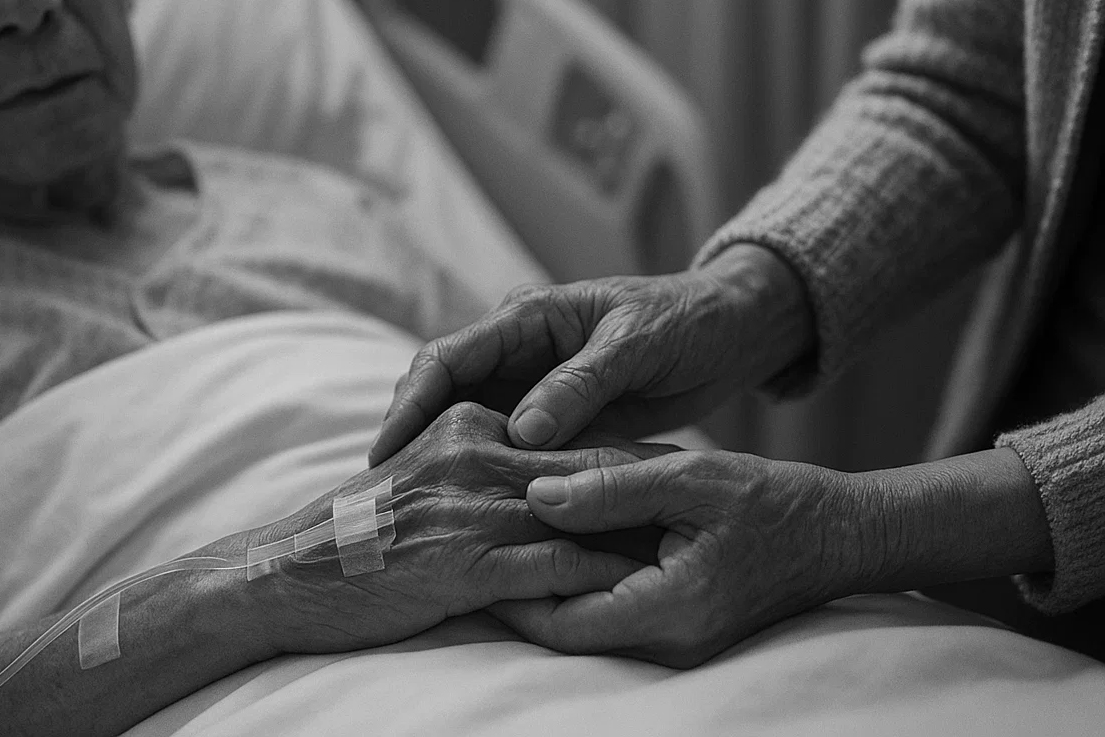Translated By Tony Qin
Xiao-Yu has been a dear friend of mine for many years. She and her family are devout Buddhists. One day, she told me that her elder brother, Da-Qiang, had been diagnosed with colon cancer and was scheduled for surgery the following month. All we could do was sincerely wish for his swift recovery.
Not long after, distressing news arrived. The surgery had not gone smoothly. The doctors found the tumor too large to remove, and it had already spread. He was diagnosed with terminal cancer and placed under palliative care. Da-Qiang was devastated and could not accept the reality of his condition. I offered to visit him, but Xiao-Yu gently declined, explaining that her brother and sister-in-law had withdrawn from others, keeping their doors closed and refusing to see anyone.
A month later, Xiao-Yu reached out again and asked if I could come to the hospital. By then, Da-Qiang had been admitted to the palliative ward and was entering the final stage of his life. Without hesitation, I agreed. It was still during the pandemic, and public hospitals had strict limits on visitors. The palliative ward allowed only two people at a time, rotating in and out. When I arrived, more than ten of his relatives were waiting outside, their faces etched with grief.
Da-Qiang seemed surprised but glad to see me. We exchanged a few lighthearted words, and I learned that his daughter and son-in-law, who had been living overseas, had rushed home to be with him. Deep down, he knew his time was short.
I asked gently, “How are you feeling? Is there anything I can do to help?”
For a moment, he sat in silence. Then tears welled up and streamed down his face. In a trembling voice, he whispered, “Why me? I’m in such pain….”
I did not try to cover his grief with words. Instead, I simply sat beside him in silence, giving him space to pour out his sorrow.
When he had calmed a little, I said softly, “I understand how you feel. But look—so many of your family members are here today, waiting outside to see you. Their love and concern show just how deep your bonds with them truly are.”
Choked with emotion, Da-Qiang said, “It’s precisely because I can’t let them go. I don’t want to leave them….”
Seeing the depth of his attachment, I too felt at a loss for words. After a pause, I said, “You know, your life has truly been a success—not because of wealth or status, but because at every stage you fulfilled your role with care and dedication. Everyone says you are a good son, a good husband, a good father, a good elder brother, a good employer, a good friend. That is a life worthy of respect.”
A faint smile spread across his face. He began to recount the struggles of building his business, how he had supported his daughter in studying abroad, and the stories of mutual care among his siblings. He said that now, with his family stable and secure, and with their finances improved, he could feel a measure of comfort.
I continued, “Then all the more reason to feel gratitude—for this life, for your loved ones, and for the precious ties of affection you have shared.”
I then offered him a teaching from the Dharma: “Buddhism teaches that the relatives we meet in this life are the continuation of unfinished connections from past lives. These ties generally take four forms: repaying debts, collecting debts, repaying kindness, or settling grievances. Many families experience resentment or conflict, and these too arise from the workings of past causes and conditions. The fact that your family has lived together in harmony is a rare blessing, built on deep roots of virtue and wholesome karma. Across countless lifetimes of rebirth, we have crossed paths with many people. To meet again in this life is already difficult; to meet as family bound by goodwill is even rarer. Life itself is but a fleeting few decades, gone in an instant. Whether our ties are harmonious or strained, we should hold them with gratitude, for they allow us to bring old karmic connections to completion.”
Da-Qiang listened intently, nodding in agreement. Before I left to let his relatives take their turn inside, he said to me, “Venerable, when they come in later, I want to thank them personally.”
Two days later, I returned. Xiao-Yu asked what I had spoken with her brother about, for his mood had grown noticeably calmer, and he no longer railed against fate. Outside the ward, his relatives gathered around me with curiosity, wanting to know which temple I came from, and how they could pray for him. His son-in-law, a Canadian, immediately pulled out his phone to look up the website of the International Buddhist Temple. Right there in the hallway, he began watching Dharma talks by Venerable Guan Cheng. From that day on, their whole family developed a deep and genuine interest in Buddhism.

